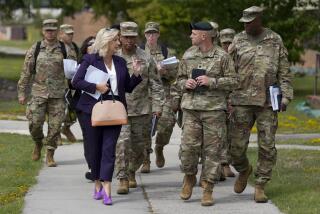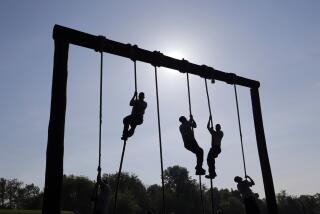War Gets in Way of Recruiting
- Share via
Being a cadet at a U.S. service academy has its perks: a free college education, a monthly stipend and a crisp uniform for mom to admire on trips home. But that package comes with a price--five years of military service beyond college--that might not seem so alluring these days.
“War is not necessarily a good advertisement” for the military academies, said Aaron Barreda, 24, who graduated from the U.S. Military Academy at West Point, N.Y., and is now a lieutenant in the Army.
Barreda, other service academy graduates and current cadets gathered last week at the office of Rep. Howard Berman (D-Mission Hills) to promote the schools to prospective applicants. Members of Congress are among those who nominate candidates for admission to the nation’s five service academies: West Point, the Naval Academy in Annapolis, Md., the Air Force Academy in Colorado Springs, Colo., the Coast Guard Academy in New London, Conn., and the Merchant Marine Academy in Kings Point, N.Y.
“In past years we’ve talked about it being a dangerous world, but this year we know how dangerous a world it is,” Berman told the handful of students seeking his support for their applications. “This is a really important thing that you’re doing, and you’re going to be the leaders by virtue of your academy service.”
America’s war in Afghanistan and the possibility that the conflict might spread elsewhere are on the minds of high school seniors going through the academies’ lengthy application process.
“The Air Force Academy is the best way for me to do what I want to do,” said Chris Culberson of North Hollywood, who wants to be an astronaut. “It’s still worth it in light of the recent events.”
Chris’ father, who considered joining the Air Force until the Vietnam War broke out, feels better about his son’s choice knowing that today’s military jets fly higher, faster and can hit their targets from farther away.
“We’re not as apprehensive . . . as we would be if he were a soldier on the ground,” Harvey Culberson said.
Enrolling at an academy insulates cadets from active service for the four years they are studying.
“It’s almost like being in a closed environment,” said Lord Cole, who just finished his first semester and first football season at the Naval Academy.
His classmate, George O’Garro, who is playing basketball for Navy, said the possibility of being deployed to a war zone after graduation rarely crosses his mind.
“I know I’m not going anywhere for a couple of years,” he said.
Upon graduation, though, academy cadets become commissioned officers and face five years of active duty. Applicants sometimes discount that, Barreda said.
“Nine years of a career--it’s a long time in any occupation,” he said.
More to Read
Sign up for Essential California
The most important California stories and recommendations in your inbox every morning.
You may occasionally receive promotional content from the Los Angeles Times.










